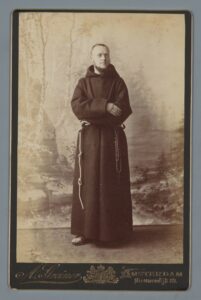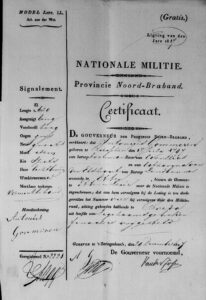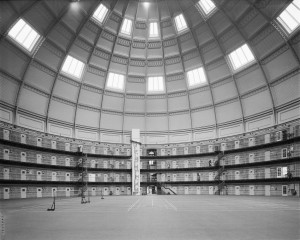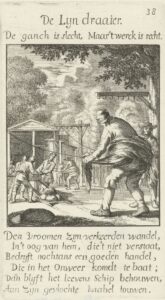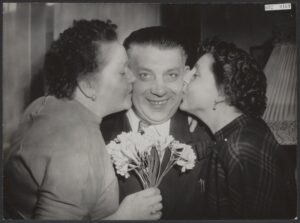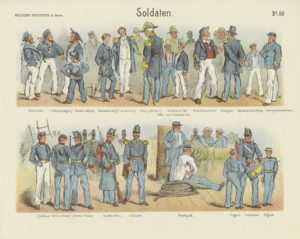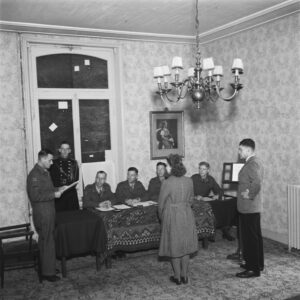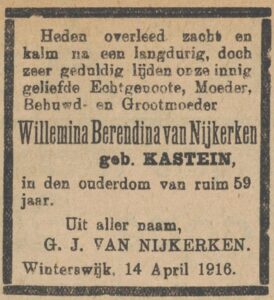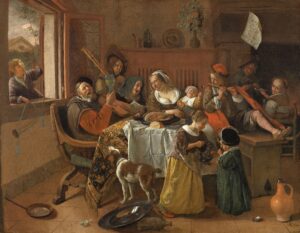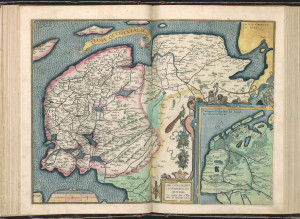A monnik is a monk. Monniken are mostly found in the Roman-Catholic parts of the Netherlands like Noord-Brabant or Limburg. Before the Reformation, they were found all over the country. In the Middle Ages, many cities had monasteries where monks lived. In some towns, the monasteries disappeared but the name can still be found in street names or field names. Nowadays, few men become monks, even among Roman-Catholics. … [Read more...]
Dutch term – Vrijstelling
A vrijstelling is an exemption. You may come across the term in military enlistment registers or marriage supplements, if a person was vrijgesteld [exempted] from military service. Example: Antonie Gommeren's military exemption When Antonie Gommeren married Adriana Timmermans in Etten-Leur on 27 January 1828, he had to prove he had fulfilled his military duties. He submitted a certificate of National Militia that included the text "uit hoofde van ligchaamsgebreken finaal vrijgesteld" [received … [Read more...]
Dutch terms for different prisons
Before 1811, locking people up was typically not used as a punishment. People could be confined while awaiting trial, or could be committed to a tuchthuis (house of discipline) where they had to do hard labor. In 1811, the French prison model was introduced, where people would be locked up in a gevangenis [prison]. The system was overhauled in 1821 and again in 1886. Here is an overview of the different terms and meanings. For more information about researching prisoners, see the articles … [Read more...]
Dutch term – Touwslager or lijndraaier
A touwslager or lijndraaier is a rope maker. The occupation can be found in many places, especially near harbors. Ropes for rigging were made in a lijnbaan, a ropeway to create long ropes. … [Read more...]
Dutch term – Zoen
In modern Dutch, a zoen is a kiss. Before say 1650, however, it was a legal term for a reconciliation. For example, if somebody was murdered, the family of the victim and the murderer could get together to see if they could come to an agreement. The agreement could have included payment of a compensation, banishment of the murderer, asking forgiveness in church, doing penitence, et cetera. If the families came to an agreement, there would be no criminal prosecution. For an example of such an … [Read more...]
Dutch term – Weerbare mannen
Weerbare mannen are able-bodied men. Some towns kept lists of weerbare mannen to know whom to count on in case they needed to defend themselves. If they exist, you can typically find them in town records, or in the archives of regional government bodies who required the towns in their region to supply these lists. … [Read more...]
Dutch term – Krijgsraad
Krijgsraad means "court martial." You may find a reference to a court martial in your ancestor's military records if they made severe transgressions. If the person was sentenced to a prison sentence, prison records may also refer to the court martial verdict. Court martial records are typically kept in the regional historical center in the provincial capital. … [Read more...]
Dutch term – Heden
Heden means "on this day." You may encounter this term in birth or death records, in family announcements in newspapers, or in any other document where the date is also found elsewhere. … [Read more...]
Dutch term – Speelkind
A speelkind [literally: play child] is a child born out of wedlock to unwed parents; not the result of adultery. Under Roman-Dutch law, a speelkind would inherit from his mother's family just like a legitimate child, but would not inherit from the father's side of the family unless explicitely named in a will. A child born from adultery, however, would inherit from neither family, not even when mentioned in a will. Speelkinderen could be legitimized by a subsequent marriage of their … [Read more...]
Dutch term – Quaclappen
Quaclappen is an archaic Dutch word that originally meant to gossip or slander. In genealogy, you may come across the term in court records, as the summaries of verdicts in civil cases. I have mostly come across the term in Friesland, where the index of quaclappen for 1527-1591 are available via Alle Friezen. Transcriptions for 1600-1620 are available via Tresoar. … [Read more...]
